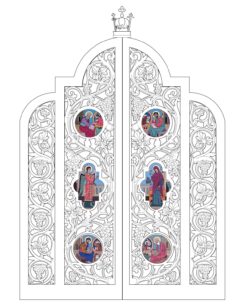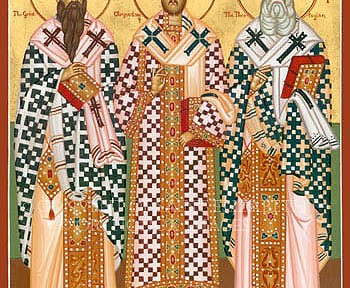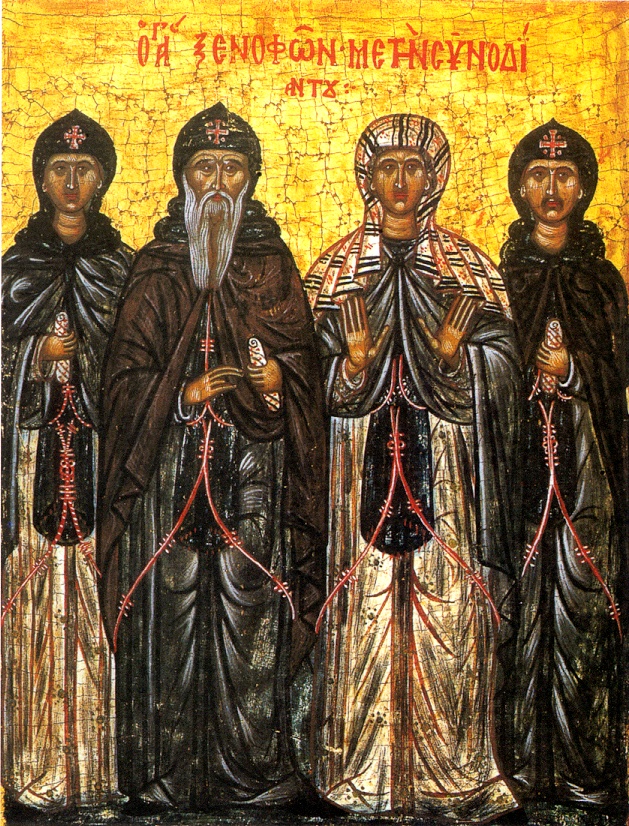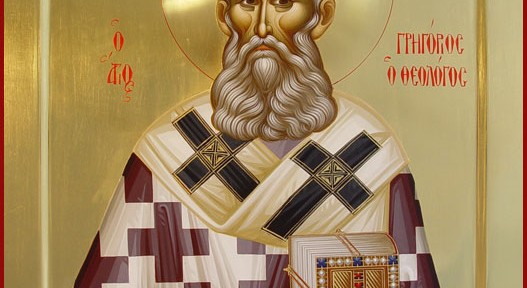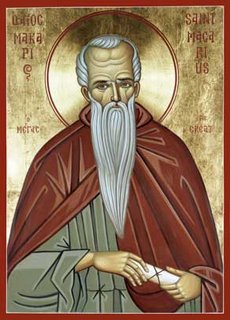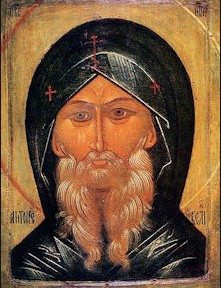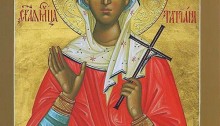Each of these saints have their own feast day. St. Basil the Great, January 1; St. Gregory the Theologian, January 25; and St. John Chrysostom, January 27. This combined feast day, January 30, was instituted in the eleventh century during the reign of Emperor Alexius Comnenus. At one time a debate arose among the people concerning who of the three is the greatest? Some extolled Basil because of his purity and courage; others extolled Gregory for his unequaled depth and lofty mind in theology; still others extolled Chrysostom because of his eloquence and clarity in expounding the Faith. Thus some were called Basilians, others Gregorgians, and the third were called Johannites. This debate was settled by Divine Providence to the benefit of the Church and to an even greater glory of the three saints. Bishop John of Euchaita (June 14) had a vision in a dream: At first, all three of these saints appeared to him separately in great glory and indescribable beauty, and after that all three appeared together. They said to him, “As you see, we are one in God and there is nothing contradictory in us; neither is there a first or a second among us.” The saints also advised Bishop John that he write a common service for them and to order a common feast day of celebration. Following this wonderful vision, the debate was settled in this manner: January 30 would be designated as the common feast of these three hierarchs. The Greeks consider this feast not only an ecclesiastical feast but their greatest national school holiday. (Prologue of Ohrid) Continue reading January 30, 2014 Three Holy Hierarchs, Basil the Great, Gregory the Theologian, and John Chrysostom
Continue reading January 30, 2014 Three Holy Hierarchs, Basil the Great, Gregory the Theologian, and John Chrysostom
Day: 1 January 2014
January 26, 2014 31st Sunday after Pentecost, Octoechos Tone 3 Our Venerable Father Xenophon and His Wife Maria
They were prominent and wealthy citizens of Constantinople. Xenophont and his wife Maria lived a God-pleasing life and dedicated all their attention to the Christian upbringing of their sons. When their sons reached majority, they were sent to study in Beirut; but it so happened that a storm capsized their boat. By the Providence of God, John and Arcadius were somehow saved. They were tossed ashore by the waves but in two different places so that each thought the other was drowned. Out of grief for each other, they both became monks in two different monasteries. After two years, their grieving parents came to Jerusalem on a pilgrimage to pay homage before the holy shrines. There, with the help of the “discernment” of a spiritual father, first the brothers met and, after that, the parents with their children. Out of gratitude to God, Xenophont and Maria distributed their entire estate to the poor and both of them were tonsured. The history of these four souls is touching and it shows how the Lord wonderfully guides the fate of those who believe in Him; how He permits pain and sorrow upon them that they may, later on, be strengthened in faith, in order to lead them into still greater joy. They lived and died in the Lord in the fifth century. (Prologue of Ohrid) Continue reading January 26, 2014 31st Sunday after Pentecost, Octoechos Tone 3 Our Venerable Father Xenophon and His Wife Maria
Continue reading January 26, 2014 31st Sunday after Pentecost, Octoechos Tone 3 Our Venerable Father Xenophon and His Wife Maria
January 25, 2014 Our Holy Father Gregory the Theologian, Archbishop of Constantinople
Gregory was born in Nazianzus of a Greek father and a Christian mother. Before his baptism, he studied in Athens along with Basil the Great and Julian the Apostate. Gregory often prophesied that Julian would become an apostate and a persecutor of the Church which actually happened. Gregory was especially influenced greatly by his good mother Nonna. When he completed his studies, Gregory was baptized. St. Basil consecrated him as bishop of Sasima, and Emperor Theodosius the Great summoned him to fill the vacant archepiscopal throne of Constantinople. He wrote numerous works of which his most famous are those concerning theology for which he is called The Theologian. Especially known because of its depth is his work: Homilies on The Holy Trinity. Gregory wrote against the heretic Macedonius who erroneously taught that the Holy Spirit is a creation of God and, Gregory also wrote against Appolinarius who erroneously taught that Christ did not have a human soul but that His divinity was in lieu of His soul. Additionally Gregory wrote against Emperor Julian the Apostate, his one-time colleague in school. In 381 A.D., when a debate began regarding his election as archbishop, he withdrew on his own and issued a statement: “Those, who deprive us of our archepiscopal throne cannot deprive us of God.” After that, he left Constantinople and went to Nazianzus and there lived a life of solitude and prayer, writing worthwhile books. Even though he was in poor health throughout his entire life, nevertheless, Gregory lived to be eighty years old. His relics were later transferred to Rome. A reliquary containing his head reposes in the Cathedral Church of the Assumption in Moscow. He was, and remains, a great and wonderful light of the Orthodox Church as much by his meekness and purity of character as well as for the unsurpassable depth of his mind. He died in the Lord in the year 390 A.D. (Prologue of Ohrid) Continue reading January 25, 2014 Our Holy Father Gregory the Theologian, Archbishop of Constantinople
Continue reading January 25, 2014 Our Holy Father Gregory the Theologian, Archbishop of Constantinople
January 19, 2014 30th Sunday after Pentecost, Octoechos Tone 2 Venerable Father Macarius of Egypt
Macarius was an Egyptian and one of the younger contemporaries of Anthony the Great. His father was a priest. Out of obedience to his parents, Macarius married. However, his wife died shortly thereafter and he withdrew into the wilderness where he spent sixty years in labor and struggle, both internally and externally for the Kingdom of Heaven. When they asked him: “Why is he so thin when he eats and when he does not eat?” He responded: “From the fear of God.” So much did he succeed in cleansing his mind of evil thoughts and his heart of evil desires that God bestowed upon him the abundant gift of miracle-working so that he even raised the dead from the graves. His humility amazed both men and demons. A demon once said to him: “There is only one thing in which I am unable to overpower you. It is not in fasting; for I do not eat anything. It is not in vigils; for I never sleep.” “But, what is it?” asked Macarius. “Your humility” answered the demon. Macarius often spoke to Paphnutius, his disciple: “Do not judge anyone and you will be saved.” Macarius lived to be ninety-seven years old. Nine days before his death, St. Anthony and St. Pachomius appeared to him from the other world and informed him that he would die within nine days, which happened. Also, before his death, Macarius had a vision in which a cherubim revealed to him the blessed heavenly world, commended his effort and his virtue and said to him that he was sent to take his soul into the Kingdom of Heaven. He died in the year 390 A.D. (Prologue of Ohrid) Continue reading January 19, 2014 30th Sunday after Pentecost, Octoechos Tone 2 Venerable Father Macarius of Egypt
Continue reading January 19, 2014 30th Sunday after Pentecost, Octoechos Tone 2 Venerable Father Macarius of Egypt
January 17, 2014 Venerable and God-Bearing Father Anthony the Great
Anthony was an Egyptian and was born about the year 250 A.D. in the village of Koman near Herculea. Following the demise of his noble and wealthy parents, he divided the inherited estate with his sister, who was a minor, and provided for her with some relatives. Anthony distributed his half of the estate to the poor and, he, in his twentieth year, dedicated himself to the ascetical life for which he yearned from his childhood. In the beginning Anthony lived a life of asceticism in the proximity of his village but, in order to flee the disturbances of people, he withdrew into the wilderness on the shore of the Red Sea, where he spent twenty years as a recluse not associating with anyone except with God through constant prayer, reflection and contemplation, patiently enduring unspeakable temptations from the devil. His fame spread throughout the entire world and many disciples gathered around him whom he placed on the path of salvation by his example and words. During the eighty-five years of his ascetical life, only twice did he go to Alexandria. The first time to seek martyrdom during the time of the persecution of the Church and, the second time at the invitation of St. Athanasius, in order to refute the accusation of the Arians: supposedly that he, too, was an adherent of the Arian heresy. Anthony died in the one-hundred fifth year of his life, leaving behind an entire army of his disciples and imitators. Even though Anthony was not a scholar, nevertheless, he was a counselor and teacher of the most learned men of that time, as was St. Athanasius the Great. When certain Greek philosophers tempted him with literary wisdom, Anthony shamed them with the question: “Which is older, the understanding or the book? Which of these two was the cause of the other?” Ashamed, the philosophers dispersed for they perceived that they only had literary knowledge without understanding and Anthony had understanding. Here is a man who attained perfection in as far as man, in general, can attain on earth. Here is an instructor to instructors and a teacher to teachers, who, for a full eighty five years perfected himself and only in that way was he able to perfect many others. Filled with many years of life and great works, Anthony died in the Lord in the year 335 A.D. (Prologue of Ohrid) Continue reading January 17, 2014 Venerable and God-Bearing Father Anthony the Great
Continue reading January 17, 2014 Venerable and God-Bearing Father Anthony the Great
January 12, 2014 Sunday after Theophany, Octoechos Tone 1 Holy Martyr Tatiana the Deaconess
Tatiana was a Roman whose parents were of great nobility. She was a Christian and a deaconess in the church. After the death of Emperor Heliogabalus, Emperor Alexander, whose mother Mammaea was a Christian, reigned in Rome. The emperor himself was wavering and indecisive in the Faith for he kept statues of Christ, Apollo, Abraham and Orpheus in his palace. His chief assistants persecuted the Christians without the emperor’s orders. When they brought out the virgin Tatiana for torture, she prayed to God for her torturers. And behold, their eyes were opened and they saw four angels around the martyr. Seeing this, eight of them believed in Christ for which they also were tortured and slain. The tormentors continued to torture St. Tatiana. They whipped her, cut off parts of her body; they scraped her with irons. So all disfigured and bloody, Tatiana was thrown into the dungeon that evening so that the next day, they could, again, begin anew with different tortures. But God sent His angels to the dungeon to encourage her and to heal her wounds so that, each morning, Tatiana appeared before the torturers completely healed. They threw her before a lion, but the lion endeared himself to her and did her no harm. They cut off her hair, thinking, according to their pagan reasoning, that some sorcery or some magical power was concealed in her hair. Finally, Tatiana along with her father were both beheaded. Thus, Tatiana ended her earthly life about the year 225 A.D., and this heroic virgin, who had the fragile body of a woman but a robust and valiant spirit, was crowned with the immortal wreath of glory. (Prologue of Ohrid)
 Continue reading January 12, 2014 Sunday after Theophany, Octoechos Tone 1 Holy Martyr Tatiana the Deaconess
Continue reading January 12, 2014 Sunday after Theophany, Octoechos Tone 1 Holy Martyr Tatiana the Deaconess
